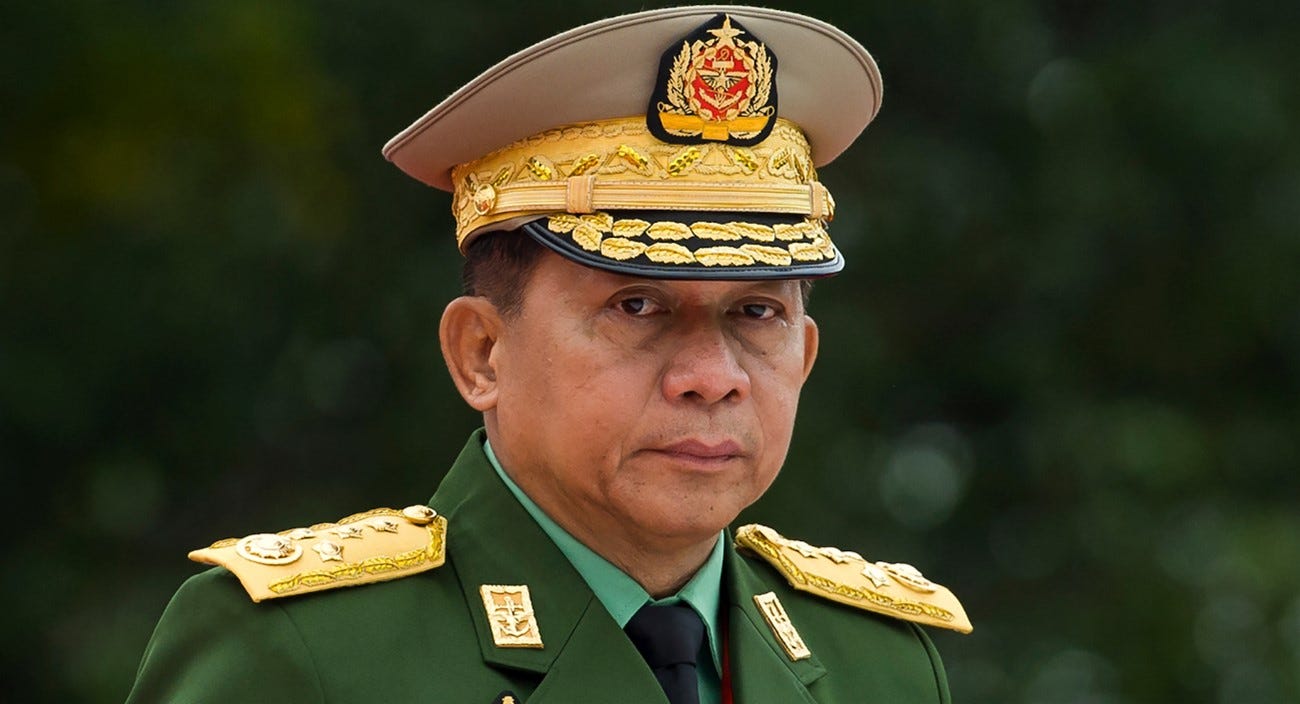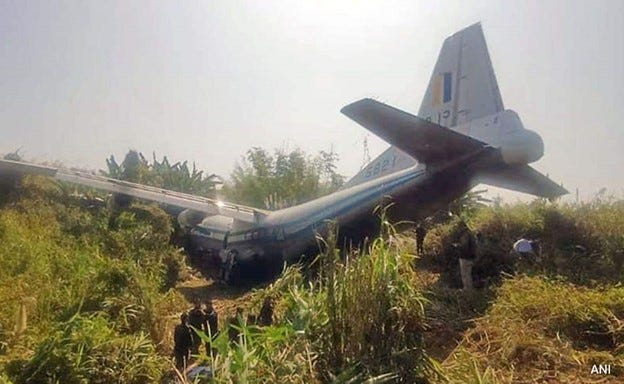Myanmar’s Military Faces Stunning Losses as Rebels Gain Strength
Junta leader said to be increasingly in danger of being sacked by the military
By: David Scott Mathieson
The surrender in Myanmar of six brigadier generals and their troops in early January to forces aligned with the National Unity Government and its allies attempting to drive the deeply unpopular junta from power is a dramatic indication of the real progress the opponents of the regime have been making in the war-torn country.
Myanmar media is reporting that the State Administration Council, as the junta calls itself, put the six senior officers on trial for surrendering to forces of the ethnic Kokang Myanmar National Democratic Alliance Army in Northern Shan State, sentencing the three heads of the Laukkai military region and the commander of the 55 Light Infantry Divisions to death in absentia and the other three to life imprisonment in the aftershocks of Operation 1027, a multi-sided offensive by the Three Brotherhood Alliance (3BA) and their allies in late October of last year, which continues to destabilize the military on the battlefield and at a senior command level. Fighter aircraft and helicopters have been shot down, and unprecedented amounts of arms and equipment seized.
The death sentences appear to be less about the surrender and more about the optics of the generals drinking a toast with their captors. Capitulation is one thing. Cavorting with the enemy is another, especially when that enemy is the nemesis of the junta’s leader, Senior General Min Aung Hlaing, who vanquished the Kokang army in 2009, only to preside over a regime that has relinquished that same enclave. Sentencing three generals to death sends a clear message to senior officers to hold the line: even as that line crumbles with hundreds of bases lost and several thousand soldiers dead and surrendered.
As the three-year anniversary of the February 2021 coup d’etat (that brought the generals to power and ended Myanmar’s budding democracy) approaches, speculation is rife that factions within the military want Min Aung Hlaing removed. He appears increasingly divorced from reality, delivering bizarre speeches on multiple topics on ethnic unity, healthcare, and education, promising imminent free and fair elections amid disregard for major, growing losses on the front lines.
Desertions seem to be growing. On January 23, a Myanmar Air Force (MAF) Shaanzi Y-8 transport overshot the runway in Northeast India’s Mizoram State, injuring the pilot and several others of the 14 personnel on board, and wrecking the plane, which was there to pick up soldiers who had crossed into India after abandoning their posts in neighboring Chin State, driven away by attacking forces of the Arakan Army (AA), which has been methodically seizing key towns and military bases in Myanmar’s west. The 276 Myanmar escapees have been in custody of the Indian military since the weekend, 36 officers and 240 soldiers, the size of a large battalion in Myanmar’s steadily degrading army.
On another front, a notorious ethnic Karen warlord, Saw Chit Thu, commander of the Karen State Border Guard Force (BGF), a paramilitary force within the Myanmar military formed in 2009, has announced he and several hundred of his men will adopt neutrality in the conflict, no longer receive salaries and support from the military, and withdraw from a joint base according to a Thai PBS report on Monday. Chit Thu holds the rank of colonel in the Myanmar army. Rumors have swirled he has met with SAC number 2, Vice Senior General Soe Win, and that negotiations are ongoing.
This is significant. Chit Thu has been a major operator not just in border business, the drug trade, but also in the Chinese casino complexes and scam centers of Shwe Ko Ko and KK Park. His ‘neutralization’, if that is what eventuates, could stem from pressure to crack down on the scam centers as happened in Northern Shan State and was an important element of Operation 1027. Or it could be that Chit Thu is reading the tea leaves and realizing he is on the losing side. As a former member of the Karen National Union (KNU), which he betrayed in 1994, leading a mutiny that created the Democratic Karen Buddhist Army (DKBA), Chit Thu has clearly taken notice that the KNU has dramatically consolidated territory and driven SAC forces out of large areas of the Southeast. The BGF was finding itself increasingly marooned in a rising sea of revolutionary territory.
This all provides a dilemma for international interests. Is the military collapsing? Will things get better or worse if Min Aung Hlaing is deposed? His deputy Soe Win is widely perceived as a psychopath who could pursue an even more violent SAC endgame. The past three months have been the low point of the Myanmar military in history but how low do they have to go to be terminal? Foreign military support was never the key to the military’s survival: their size, brute force, propensity for repression and a domestic arms production capacity was their core strength. That is all being staggeringly degraded and their enemies are getting stronger. Even if they wanted another foreign lifeline for military assistance, and the only one they have is Russia, it wouldn’t save them.
The big question is China’s role. Beijing is still hedging with all parties, junta or rebels. They don't actually care who runs Myanmar, as long as the vast ‘pig butchering’ factories that employ tens of thousands of Chinese and kidnapped other nationalities get shut down and they get all their Chinese nationals back, criminal or otherwise. China’s other concern is whoever can guarantee the security of the Kyaukphyu-Kunming oil pipeline, the biggest asset in China's goal of advancing its energy security by bypassing the Malacca Straits chokepoint which the US effectively controls from Changi Naval Base in Singapore.
The growing power of the rebels also raises questions for ASEAN, which has dithered for months over what to do about Min Aung Hlaing and his fellow Tatmadaw leaders, who have delivered arguably Asia’s most repressive regime after a November 2020 election that humiliated army-backed candidates and put democracy icon Aung San Suu Kyi in a position of real power. The civil war is not a clear-cut matter of a democratically elected civilian government fighting against military junta usurpers who seized power (again) in a coup years ago. While the exiled National Unity Government and everyone in the so-called Three Brotherhood Alliance, made up of the Arakan Army, the Myanmar National Democratic Alliance Army, and the Ta’ang National Liberation Army, is united in fighting the junta, once the junta is defeated, if it is, infighting is likely as various regional ethnonationalist factions start to press their secession goals more openly. The United Wa Army and the Shan State Army, long in existence, have carved out their own national identities and are unlikely to submerge them in a national federation.
China may have brokered a ‘ceasefire’ in recent weeks, but that hasn’t stopped the conflict. Beijing has little control over the junta, and few leverage points: threatening to end military support for the regime would have little effect. Thailand appears more open to the idea of a junta implosion and is mindful of longer-term border trade and security stability. India remains bewildered, as it usually is with Myanmar. The West are hapless bystanders, wondering what comes next if the military are vanquished. Right now, the plan is simply finishing off the SAC, which, unlikely as it had seemed, is a growing possibility.
David Scott Mathieson is an independent analyst working on conflict, humanitarian and human rights issues on Myanmar, based in Myanmar and along the borders since 2002



A very good piece with sound analysis, and I agree with Mr. Mathieson's view of the situation. But I do think there is every chance we will see the "balkanization" of Burma (I refuse to call it Myanmar). [It is as ridiculous as the fascist Hindu racist Narendra Modi calling India "Bharat". Next to religion, nationalism, of any sort, drives deep divisions and wars. Nationalism and patriotism are false ideologies and paradigms.] I think we will see the making of the Yugoslavian crisis in Burma and in fact civil war once the disastrous, murderous junta is totally defeated and the struggle for power, more through guns than votes, will ensue, breaking up the The Brotherhood Alliance which, to all intents and purposes, is very much a marriage of convenience. In the long run it will not stick together (my view) for obvious reasons.
Not at all surprised by China's state of play in this conflict (no different to American and its allies' meddling). But the oil pipeline is one of the most critical factors for the Chinese economy that looks to have more than hit the skids, and the emperor Xi Jinping is struggling to find answers to putting a floor beneath the sinking Chinese economy. And energy is one of the main drivers of the Chinese economy, which explains why China has roamed the world and sided with notorious autocratic regimes and dictatorships in search of raw resources to keep its economy billowing pollution and ultra-cheap lousy goods through vast labor exploitation regimes). In other words, China needs a Burma that won't collapse into a protracted civil war. And even if one is avoided, it is most likely that any agreement between the invested parties will not last in the long run. Which again brings us back to what China will do about its influence in Burmas and especially of its "pig butchering" investments. This is no different to the hopeless weak and useless ASEAN countries (especially Singapore and Malaysia), who have investments in Burma that are, in my view immoral to the extent that they have inevitably lent legitimacy to the murderous Burmese junta.
As for Min Aung Hlaing and his underlings, as much as I would like to see them caught, tried (for want of a better word), lined up against a wall and shot down like dogs -- one by one -- I suspect Beijing will lend them safe passage and refuge in China. If it has with the 1MDB crook Jho Low, who hides in China like the coward that he is, why not the Burmese generals too?
Meanwhile, watch what India does on its eastern security flank ...